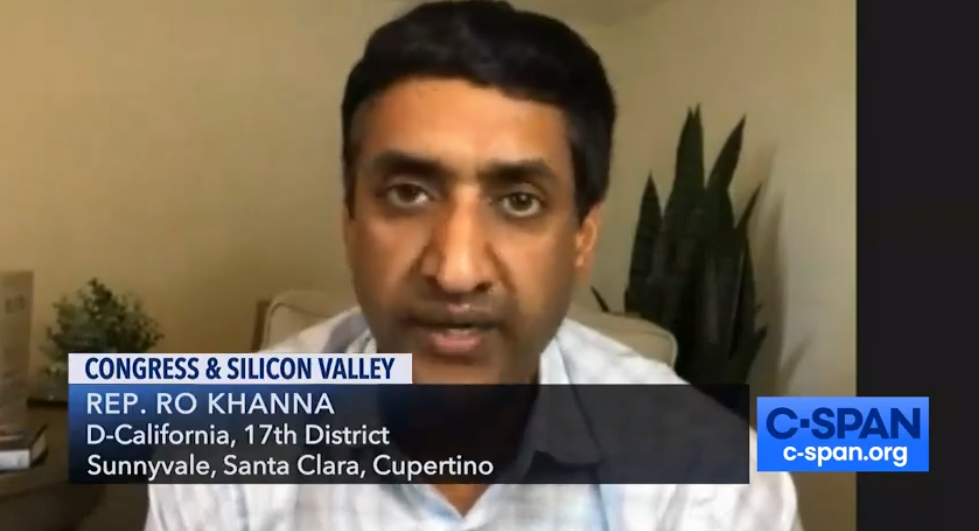Rep. Khanna: Big Tech Needs 'Well Crafted' Regulation
The smarter way to stay on top of the multichannel video marketplace. Sign up below.
You are now subscribed
Your newsletter sign-up was successful
Rep. Ro Khanna, (D-Calif.) points to some of the good things Big Tech is doing amidst the hefty criticism coming from Washington over some of the not-so-good, but says online platforms' story is a "complex narrative" and one that will likely need chapter on regulation.

In an interview for C-SPAN's Communicators series, Khanna pointed to things like Zoom, which is connecting Americans during the pandemic, as well as the high tech folks working on a vaccine.
But that said, he said, there are clearly ethical issues about whether online platforms are paying front-line workers enough or doing enough to combat hate speech and voter suppression.
Related: DOJ Proposes Sec. 230 Reforms
Asked whether he favored we regulations on Big Tech, he said yes, so long as it is "well crafted." Big Tech players themselves, notably Facebook's Mark Zuckerberg, have also said it may be time for such well crafted legislation, so Khanna is not straying to far from his constituents in Silicon Valley.
He pointed to an Internet Bill of Rights he came up with with internet pioneer Tim Berners-Lee that has regulations to protect privacy, foster competition, port one's data. He also cited regs that would make sure independent contracts can get a living wage. He called that "good, sensible" regulation.
What he does not favor, he said, is a regulatory "sledgehammer" that hurts innovation or consumers of job creation.
The smarter way to stay on top of the multichannel video marketplace. Sign up below.
The House Judiciary Committee is holding a hearing July 27 on "Online Platforms and Market Power, Part 6: Examining the Dominance of Amazon, Apple, Facebook, and Alphabet (Google)," where their respective CEO's Jess Bezos, Tim Cook, Mark Zuckerberg, Sundar Pichai are expected to testify.
Khanna is not on the committee, but was asked what he would want to hear from the Big Tech execs.
Khanna said he was looking to make sure they did not have an "anticompetitive platform privilege."
The Justice Department is currently looking into whether some of the biggest of Big Tech bought their way up to monopoly and foreclosed competition by buying up potential competitors before they were big enough to trigger antitrust reviews.
Related: Senate Judiciary Approves EARN IT Act
Khanna said companies should not be able to use their platforms to suppress competition. But he said the conversation needs to be nuanced, rather than the conversational sledgehammer of simply saying "let's break up Apple or Google.
He said he favors a nuanced update to antitrust laws to capture the new marketplace, one that goes beyond strictly consumer welfare to impact on jobs and communities and suppressing competition. He also said large mergers should be scrutinized more heavily. For example, he did not think in retrospect that the Facebook/Instagram and Facebook/Whatsapp mergers should have been approved. He felt there should be a much higher bar for approval going forward.
He said Justice should also be looking at whether large platforms are providing access to others or prioritizing their own content or search, and making sure they are doing the former and not doing the latter.
He said Big Tech getting bigger--Amazon and Whole Foods, for example--is problematic. "I really think these tech companies should be limiting themselves to organic growth."
Facebook is in the midst of an advertiser boycott over its generally hands-off approach to third party speech on its platform--it is protected from civil liability over most of that speech.
Khanna said Facebook should instead regulate or "deamplify" speech that suppresses the vote or leading to violence or "making it harder for others to have equality on that platform."
Khanna disputes the assertion that conservative speech is being deamplified or suppressed. "I don't think that is true at all. Facebook and Twitter have taken things down on the left as well if they found that speech was harassing or inciting violence or if it was unlawful."
He said he was not looking to ban Donald Trump from social media platforms. "He is still the President." "But if he has an inflammatory tweet should it be amplified? No."
Khanna said he was not in favor of regulating social media platforms and "broadband companies" as utilities, though he appeared to be talking about common carrier regs on social media companies, rather the issue of ISPS and Title II vs. I. "I think that is a step too far," he said. "I would not trust federal regulators to understand the innovation that is required to make the next iPhone."
Related: Senate to Vet Edge Provider Liability Bill
Khanna said he would be open to modifications of the Sec. 230 law that provides Facebook and other platforms with civil liability immunity for how they moderate, or don't, third-party content, but again he was not looking for the sledgehammer of doing away with it. He said he has yet to see a 230-related bill he could support.
Khanna's Communicators episode airs on C-SPAN Saturday, July 18,at 6:30 p.m. ET and Monday, July 20, on C-SPAN2 at 8 a.m. and 8 p.m. ET.
Contributing editor John Eggerton has been an editor and/or writer on media regulation, legislation and policy for over four decades, including covering the FCC, FTC, Congress, the major media trade associations, and the federal courts. In addition to Multichannel News and Broadcasting + Cable, his work has appeared in Radio World, TV Technology, TV Fax, This Week in Consumer Electronics, Variety and the Encyclopedia Britannica.

